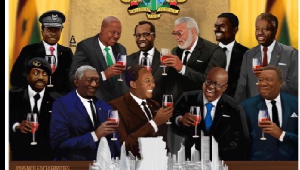Though the people’s power has been in existence since the advent of democracy in the country, it has now begun showing its potency, and the whole nation must sustain it in a non-partisan manner as it helps to ensure good governance and accountability.
Just days ago, the people’s power forced the curtailment of the sale to a private company of the 60-percent stake the Social Security and National Insurance Trust (SSNIT) holds in four state hotels.
The latest episode of the force of the people’s power is the public outcry against the Legislative Instrument (LI) seeking to amend portions of the Road Traffic Regulations, 2012 (LI 2180), which has caused its withdrawal.
The withdrawal of the LI must not end there because attention must be called to certain matters arising from the whole issue.
It is clear that public officials, particularly politicians, who have been given the people’s (state) power to solve problems beyond the remit and capacity of the masses have shirked their responsibilities and yet want ways to avoid the difficulties associated with challenges that have resulted from their own negligence, ineptness, or inaction.
The major reason for the gridlocks in the country, which certain Members of Parliament (MPs) want some categories of public officials to avoid, is the lack of proper spatial planning, something the district assemblies, particularly the metropolitans and municipals, have woefully failed to check.
If there were access roads or even streets everywhere in the cities and big towns, the country would not suffer the kind of disturbing traffic jams that some people want to escape.
Everyone living in the country, under normal circumstances, should experience all the difficulties in it so that duty-bearers would do all in their power to ensure the needful rather than shirk their responsibilities with nothing to suffer or lose for that.
There is another matter to look into.
Why should the LI be concealed from the Speaker of Parliament, Alban Sumana Kingsford Bagbin, until it causes a controversy on social media?
How was the LI going to pass without the authority of the Speaker backing it?
The Speaker’s explanation that even if, for example, the House disagrees with one provision in an LI, legislators are not allowed to amend it but can either throw out the whole LI or allow it to pass is a clear indication that some state officials are arrogating to themselves powers they do not possess.
Such people, when found out as it has happened in Parliament, must be sanctioned, and we expect that at parliament to serve as a deterrent to public officials everywhere in the country.
It is not the best when public officials wield absolute power, which gives them the privilege to be even more lawless.
Besides, for the Minister of Local Government, Decentralization, and Rural Development, Martin Adjei-Mensah Korsah, to say that the withdrawal of the now controversial LI was a result of extensive consultations smacks of a lack of critical considerations in the lawmakers’ work.
This deserves condemnation because it gives the impression that Parliament can take the people for granted and pass laws that favour a class of people deemed to be better human beings than the people in whom state power resides, and this is a serious blunder.
Editorial News of Thursday, 18 July 2024
Source: ghanaiantimes.com.gh













